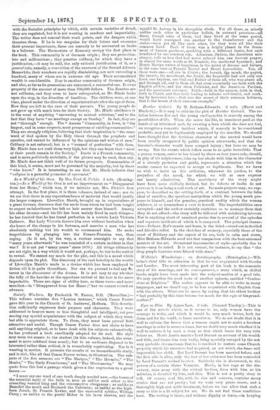Mother Gabriel. By M. Betham-Edwards. 3 vols. (Hurst and Blacketk)—It
is easy to criticise the plot of Brother Gabriel. The re- lation between Zoe' and the young ex-Capuchin is scarcely among the possibilities of life. When she saves his life, in imminent peril at the hands of an infuriated mob, by avowing a love which she does not feel, we recognise a romantic incident which, if scarcely to be considered probable, may yet be legitimately employed by the novelist. We should have thought that the fictitious character of the avowal would have been readily recognised by public opinion afterwards, and that the heroine's character would have escaped injury ; but here we may be wrong. But the events which fellow seem to us quite incredible. That a young woman, senior to her friend by three or four years only, should, in pity of his helplessness, take up her abode with him in the character of a sisterly protector and guide, represents a situation which the reader cannot be expected to accept as legitimate. But we have no wish to insist on this criticism, whatever its justice, to the prejudice of the novel, for which wo will at once express
our hearty admiration. The machinery of the story might have been more skilfully devised, but its defects or faults do not prevent it from being a real work of art. Its main purpose may, we sup- pose, be described as the setting-forth of a contrast between the false ideal of sacrifice, the spurious martyrdom which the young monk pro- poses to himself, and the genuine, practical reality which the woman achieves, at so tremendous a cost to herself. The improbabilities once accepted—and the author certainly contrives so to manage them that they do not offend—the story will be followed with unfaltering interest. Nor is anything short of unmixed praise due to several of the episodes and separate incidents of which it is composed. The principal charac- ters—Delmar. Zoe's cousin and lover, is the third—stand out in decided and life-like relief. In the sketches of scenery, especially those of the coast of Brittany and the aspect of its sea, both in calm and storm, Miss Betham-Edwards need not fear comparison with the best esteemed masters of the art. Occasional inaccuracies of style—probably due to haste—may be noted. It is not correct, for instance, to say that " tho deep purple heavens were blazed with stars."






























 Previous page
Previous page